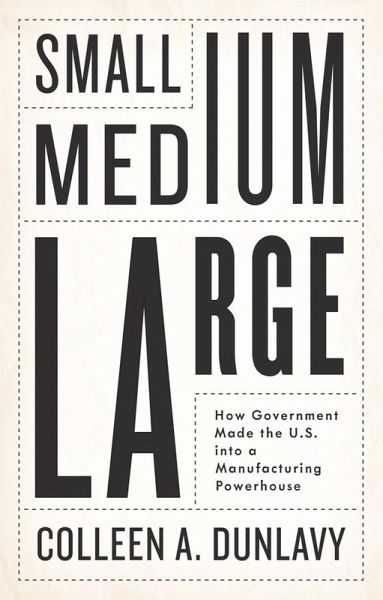
Small, Medium, Large (eBook, ePUB)
How Government Made the U.S. into a Manufacturing Powerhouse
Versandkostenfrei!
Sofort per Download lieferbar
27,99 €
inkl. MwSt.
Weitere Ausgaben:

PAYBACK Punkte
0 °P sammeln!
We live in a world of seemingly limitless consumer choice. Yet, as every shopper knows without thinking about it, many everyday goods - from beds to batteries to printer paper - are available in a finite number of "standard sizes." What makes these sizes "standard" is an agreement among competing firms to make or sell products with the same limited dimensions. But how did firms - often hotly competing firms - reach such collective agreements? In exploring this question, Colleen Dunlavy puts the history of mass production and distribution in an entirely new light. She reveals that, despite the ...
We live in a world of seemingly limitless consumer choice. Yet, as every shopper knows without thinking about it, many everyday goods - from beds to batteries to printer paper - are available in a finite number of "standard sizes." What makes these sizes "standard" is an agreement among competing firms to make or sell products with the same limited dimensions. But how did firms - often hotly competing firms - reach such collective agreements? In exploring this question, Colleen Dunlavy puts the history of mass production and distribution in an entirely new light. She reveals that, despite the widely publicized model offered by Henry Ford, mass production techniques did not naturally diffuse throughout the U.S. economy. On the contrary, formidable market forces blocked their diffusion. It was only under the cover of collectively agreed-upon, industrywide standard sizes - orchestrated by the federal government - that competing firms were able to break free of market forces and transition to mass production and distribution. Without government promotion of standard sizes, the twentieth-century American variety of capitalism would have looked markedly less "Fordist."
Small, Medium, Large will make all of us think differently about the everyday consumer choices we take for granted.
Also available as an audiobook.
Small, Medium, Large will make all of us think differently about the everyday consumer choices we take for granted.
Also available as an audiobook.
Dieser Download kann aus rechtlichen Gründen nur mit Rechnungsadresse in D ausgeliefert werden.













